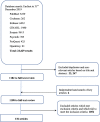A systematic scoping review of approaches to teaching and assessing empathy in medicine
- PMID: 34020647
- PMCID: PMC8140468
- DOI: 10.1186/s12909-021-02697-6
A systematic scoping review of approaches to teaching and assessing empathy in medicine
Abstract
Background: Empathy is pivotal to effective clinical care. Yet, the art of nurturing and assessing empathy in medical schools is rarely consistent and poorly studied. To inform future design of programs aimed at nurturing empathy in medical students and doctors, a review is proposed.
Methods: This systematic scoping review (SSR) employs a novel approach called the Systematic Evidence Based Approach (SEBA) to enhance the reproducibility and transparency of the process. This 6-stage SSR in SEBA involved three teams of independent researchers who reviewed eight bibliographic and grey literature databases and performed concurrent thematic and content analysis to evaluate the data.
Results: In total, 24429 abstracts were identified, 1188 reviewed, and 136 included for analysis. Thematic and content analysis revealed five similar themes/categories. These comprised the 1) definition of empathy, 2) approaches to nurturing empathy, 3) methods to assessing empathy, 4) outcome measures, and 5) enablers/barriers to a successful curriculum.
Conclusions: Nurturing empathy in medicine occurs in stages, thus underlining the need for it to be integrated into a formal program built around a spiralled curriculum. We forward a framework built upon these stages and focus attention on effective assessments at each stage of the program. Tellingly, there is also a clear need to consider the link between nurturing empathy and one's professional identity formation. This foregrounds the need for more effective tools to assess empathy and to better understand their role in longitudinal and portfolio based learning programs.
Keywords: Empathy; Medical education; Medical schools; Nurturing empathy.
Conflict of interest statement
The authors declare that they have no competing interests.
Figures
References
Publication types
MeSH terms
LinkOut - more resources
Full Text Sources
Other Literature Sources



